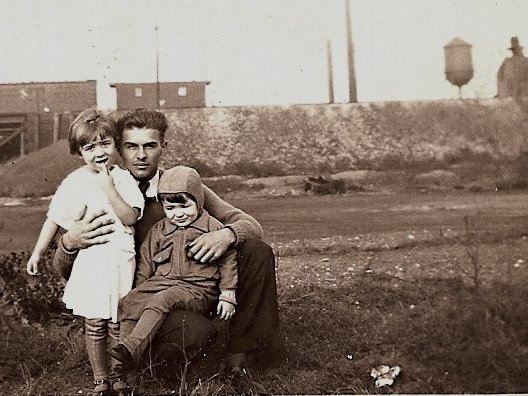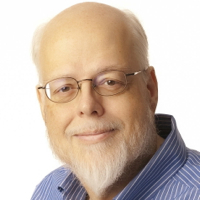My father would have turned 100 years old today.
The number seems unbelievable, just as hard for me to fathom as the fact that he's been dead for nearly a quarter of a century.
I was the last of five children, born when my dad was nearing the age I'm at now. My mother was five years younger than he was, and she outlived him by a little more than two years. Though they've been gone for decades, their influence remains strong.
And my dad's story hooked me on history.
John Cuprisin was born in Marblehead, Ohio, on April 3, 1910. To talk to him, you would have pegged him as an immigrant. His accent betrayed a Middle European background.
When my dad was two, his father, Petro Cuprisin packed up the family and returned to the village where he was born, Hrabovčík. Today, the village is in northeastern Slovakia, but back then it was in Austria-Hungary.
Family lore says my grandfather got a letter from the village to tell him that his own father, also named Petro Cuprisin had died. My grandfather was the oldest son, and would have inherited the scattered patches of land around the village that made up the Cuprisin homestead. Since arriving in the US in the early years of the 20th Century, my grandfather had worked in a limestone quarry.
But the prospect of land of his own must have been a strong temptation, and my grandparents packed up the family -- my father, his older brother, Andy, and two sisters, Anna and Helen -- and took the opposite of the immigrant journey, returning to the homeland.
As the story goes, my grandfather arrived in Hrabovčík in 1912 to find his own father very much alive.
According to this tale, my grandfather's younger brothers were jealous of his success in the U.S. and made up the story. Whether that's true or not, my grandfather and his family found themselves working the family farm on June 28, 1914, when gunshots rang out in another part of Austria-Hungary, Sarajevo, killing the Archduke Franz Ferdinand, and his wife, Sophie.
The assassination by Serb nationalists set off a chain reaction that plunged Europe into war. More importantly to my story, it put Petro Cuprisin into a military uniform and, he was sent off to fight for Emperor Franz Josef against the invading army of Russia's Tsar Nicholas II. Like countless other conscripts, he eventually (and probably willingly) found himself a prisoner of war, sent to a camp somewhere in the Russian Empire.
The village of Hrabovčík was on the front lines in the early months of the war, as the Russians moved south through the passes in the Carpathian Mountains. My father was four or five at the time, but he clearly -- and fondly -- remembered the Russian soldiers in the village. The people of Hrabovčík were Carpatho-Rusyn, an East Slavic ethnic group that felt themselves closer to the Russians than the Austrians and Hungarians who ruled them.
Dad recalled being hungry and a giant Russian soldier (giant, of course, in the eyes of a young boy) lifting him up on his shoulders to take him through the chow line set up to feed the troops. Many decades later, my father remembered the bread and soup he got from the Russians.
Petro Cuprisin's health was ruined during his time as a POW. Though he lived another two decades, he never really recovered. The end of the war brought changed borders and new governments, and my dad's school years were spent in a new country, Czechoslovakia.
My grandparents never returned to America. But my dad, with American citizenship, did. At the age of 17, he followed his older brother, Andy, back to the land where he was born, settling in Chicago. His younger sister and brother, born after the war in the new Czechoslovakia, lived out their lives in and around their birthplace.
I'm sorry if this family history lesson was a bit much. But it never seemed dry or remote when my dad told it to me. It seemed as fresh and alive as if it happened yesterday.
The story remains alive as my late father seems to me today, on his 100th birthday.
Tim Cuprisin is the media columnist for OnMilwaukee.com. He's been a journalist for 30 years, starting in 1979 as a police reporter at the old City News Bureau of Chicago, a legendary wire service that's the reputed source of the journalistic maxim "if your mother says she loves you, check it out." He spent a couple years in the mean streets of his native Chicago, and then moved on to the Green Bay Press-Gazette and USA Today, before coming to the Milwaukee Journal in 1986.
A general assignment reporter, Cuprisin traveled Eastern Europe on several projects, starting with a look at Poland after five years of martial law, and a tour of six countries in the region after the Berlin Wall opened and Communism fell. He spent six weeks traversing the lands of the former Yugoslavia in 1994, linking Milwaukee Serbs, Croats and Bosnians with their war-torn homeland.
In the fall of 1994, a lifetime of serious television viewing earned him a daily column in the Milwaukee Journal (and, later the Journal Sentinel) focusing on TV and radio. For 15 years, he has chronicled the changes rocking broadcasting, both nationally and in Milwaukee, an effort he continues at OnMilwaukee.com.
When he's not watching TV, Cuprisin enjoys tending to his vegetable garden in the backyard of his home in Whitefish Bay, cooking and traveling.



